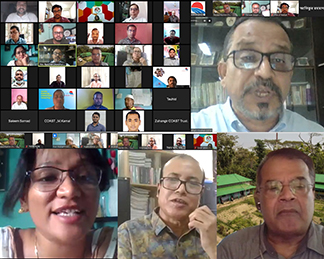28th July 2020. Today CCNF (Cox’s Bazar CSO NGO Forum) organized a virtual press conference on recent distribution of COVID19 CERF (Central Emergency Response Fund) in Rohingya response. The press conference was attended by media persons from both Dhaka and Cox’s Bazar. CCNF leaders questioned the role of ISCG (Inter Sectoral Management Group) who manage the Rohingya response led by UN agencies, as they hardly gave access to local NGOs and local governments. They have also questioned ISCG and UN role in distribution of CERF, which they termed as top- down and pre decided matter. None of the Cox’s Bazar origin NGO received the fund. They also said that, UN hardly respected the Grand Bargain commitment moreover recently announced IASC (Inter Agency Standing Committee) guideline on localization during COVID 19. IASC is the highest UN body formed in view UN general council resolution for coordinated and principled humanitarian response.
The press conference was moderated by Mr. Rezaul Karim Chowdhury, Co-Chair CCNF and ED COAST while the other speakers are Mr. Abu Morshed Chowdhury Co-Chair CCNF and ED PHALS; Mr. Bimol Chandra Dey Sarker Co-Chair and CEO Mukti Cox’s Bazar and Mrs. Sheuly Sharma, ED, Jago Nari Unnayan Sangsta, Cox’s Bazar.
Mr Abu Morshed Chowdhury said that, UN and ISCG has given little time and put a lot of conditionality which restricted the local NGOs to apply. But from the discussion with high officials it is already understood that who will get fund was already decided somewhere in top. He also said that International NGOs should bring fund from their own origin country, not raise fund or compete with local NGOs in Bangladesh and Cox’s Bazar. In future, all Rohingya response fund should be decided in Cox’s Bazar level with the involvement of local administration for better accountability, transparency and cost effectiveness.
Mr. Bimol Chandra Dey Sarker said that, due to language and process barrier local NGOs have very little access to ISCG process. He said that CCNF was proposing proportionate funding from CERF for local, national and international NGOs. Since the beginning CCNF was raising the issue of aid transparency and disaggregated figures and gradual transfer of technology and know-how to the local actors.
Mrs. Sheuly Sharma said that, UN leaders have commitment for localization in Rohingya response. They have formed LTF (Localization Task Force) and assigned CPJ (Centre for Peace and Justice) of BRAC University to give a report on localization road map. But it is almost two years but there is little result. INGOs and UN agencies often talk about the lack of capacity of local NGOs. But now it is the matter of capacity exchange or convergence. They should not deny that all above local NGOs will not leave even if there is no funding. They will remain here as a part of the local community.
Mr. Rezaul Karim Chowdhury mentioned that, during 2018 there a was good example of ISCG and CCNF jointly organized public dialogues with local NGOs and local government on JRP, but the present ISCG leadership avoided to cooperate while proposal was given from CCNF. CCNF leadership pro-actively tried to have meeting on JRP and other issues but response was very little. He also said it is the rights of the Rohingyas and locals to raise questions on how much aid is received for the refugees. Government of Bangladesh should protect the interest of local NGOs, host community including the interest of Rohingya refugees on having control and ensuring transparency of fund and management.
Please download Related Paper [Bangla Press] [English Press]
Press Statement of Cox’s Bazar CSO-NGO Forum (CCNF) [Bangla] [English]
Newspaper Link
 |
 |
 |
 |

